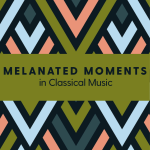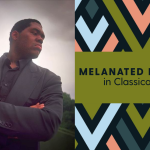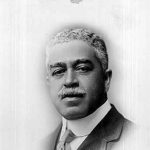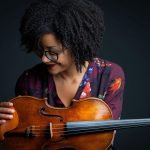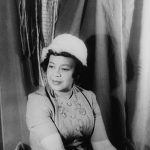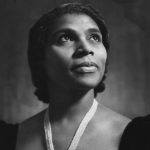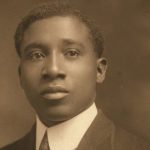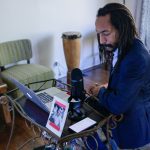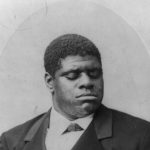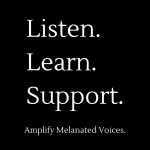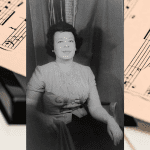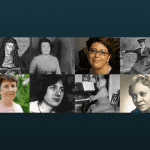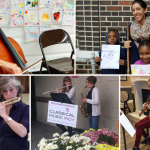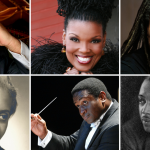MMCM S3E7: A Classical Case Study in Identity – Rev. Dr. Alisha Lola Jones presents Florence Price
Joshua and Angela welcome the distinguished ethnomusicologist Rev. Dr. Alisha Lola Jones to discuss one of the most important women composers of all time, Florence Price. An authority on Price, Dr. Jones tells of Price’s groundbreaking career path that dispelled the overwhelming barriers to a Black female composing music.
Featured Music:
“Fantasie Negre,” performed by Samantha Ege
“Feet o’ Jesus,” performed by Dr. Ollie Watts Davis
“My Soul’s Been Anchored in the Lord,” performed by Leontyne Price
Joshua Thompson (00:00): Before we get started with this episode, we wanted to thank everyone for your amazing support of this podcast. As our podcast community grows, we have added resources for each episode. So just visit our website to access blog posts and transcripts for each episode or follow us on social media and email us anytime with your podcast suggestions to melanatedmoments@classicalmusicindy.org. Angela Brown (00:44): Hey everyone! Welcome back to Melanated Moments in Classical Music. I’m Angela Brown. Joshua Thompson (00:51): And I’m Joshua Thompson. Angela, today, I understand that you have a person who was not only a Reverend, a doctor, an author, and an ethnomusicologist, but she’s also an aficionado on the life and music of the amazing Florence Price. Angela Brown (01:10): Baby, she busy ain’t she! Speaker 1 (01:12): [Laughter] Sounds like it to me! Angela Brown (01:14): Yes! She’s all that and more. You know, I had the opportunity to be in a university panel discussion group with her during the lockdown. And she was so charming and engaging and knowledgeable about the subject we were discussing. I was just intrigued and wanted to get to know her better. So we exchanged info and life went on. Well, then, as fate would have it, we ended up shooting a documentary in Chicago just a few months ago, together. And we just had fun getting to know each other. She is sweet as she is smart and– talking about a around-the-way girl, hunty! Lovin’ me some her! My kind of people are down to earth. Somehow we got to talking about Melanated Moments, and you know how we do!– Joshua Thompson (02:02): Mmhmm! Angela Brown (02:02): –And I just was like, um, “so, um, would you like to come onto the show?” And she was like, “well, what would we talk about?” And she said, “well, you know, I am an aficionado on Florence Price”. I said, “Girl, that’s what we could talk about! Talk about Ms. Florence Price”. And here she is. And I tell you, we’re just excited to have her. Joshua Thompson (02:25): Absolutely! Angela, now, you know, I’m excited to get into all of the stuff and things about Florence Price, but if you don’t mind– for myself and for our listeners out there, could you give us just a little bit more background on our distinguished and special guest today? Angela Brown (02:41): Well, I guess I’ll take you all out of suspense. Dr. Jones is an associate professor in the Department of Folklore and Ethnomusicology and faculty director of The Globe Pop Music Initiative at Indiana University in Bloomington. Dr. Jones is a board member of The Society of Ethnomusicology, a member of The Strategic Planning Task Force with the American Musicological Society and a chair– a co-chair of The Music and Religion Section of The American Academy of Religion. Additionally, as a performer scholar, she consults museums, conservatories, seminaries, and arts organizations on curriculum, live and virtual event planning, and current development. Dr. Jones’ book, Flaming- The Peculiar Theo-politics of Fire and Desire and Black Male gospel performance, breaks ground by analyzing the role of gospel music making and constructing and renegotiating gender identity among black men. Now say that 10 times fast, okay! Joshua Thompson (03:56): Wow! Angela Brown (03:56): Her research interests extend to: global pop music, musics of African diaspora, music and food, the music industry and the marketplace, and anti-oppressive ways of listening to black women. Calm down!– Joshua Thompson (04:13): Hear, hear! Angela Brown (04:14): And you gone hear us, okay? Now just calm down! Joshua Thompson (04:19): [Chuckle]. Angela Brown (04:19): As a Pentecostal inflected non-denominational Christian, Reverend Dr. Jones is a fourth generation preacher, on both sides of her family, okay! Rightly divining the Word of God! Little- known fact is that Dr. Alisha Lola Jones and her sister, Reverend Angela Marie Jones– you know, I’m an Angela Marie, uh huh– are co-owners of Paradise Media Group, a black woman owned radio company based in Oxford and Henderson, North Carolina; continuing the multimedia work pioneered by their parents, Reverend Dr. Alvin Augustus Jones and Reverend Dr. Martha Butler Jones. Reverend Dr. Alisha Lola Jones is newlywed to Reverend Calvin Taylor Skinner, her partner in both ministry and love! Next year, she will be joining the music faculty of The University of Cambridge in England, child, as an associate professor! It is our esteemed pleasure to welcome to Melanated Moments in Classical Music: Reverend Dr. Alisha Lola Jones. Girl! Rev. Alisha Lola Jones (05:37): I love it, I love it; it’s so good to be here! Joshua Thompson (05:41): Welcome. And we’re excited to have you thank you for taking time and making time to spend the afternoon with us today. Rev. Alisha Lola Jones (05:48): Absolutely. I wouldn’t have it any other way on a Friday. Joshua Thompson (05:51): I love it. Well, you gone have it the way you want it! So here you are. We’re excited to have you with us Dr. Alisha Lola Jones. Before we get into the who, the what, and the why of everything, Um, if it’s okay, I’m just going to take a little moment to give a very– if cliff notes had cliff notes– cursory overview to our listeners about our subject matter today, which is Florence Price. So she was born Florence Beatrice Price, April 9th, 1887 and died on June 3rd, 1953 and was an absolutely prolific American classical composer, pianist, organist, and music teacher. Price is noted as the first African American woman to be recognized as a symphonic composer and the first to have a composition played by a major orchestra. She has composed numerous works for symphonies, for concertos, as well as choral works, plus art songs and music for chamber and solo instruments. And since we have the expert here with us, she will fill in all of the gaps. But I do have a question for you, Dr. Jones. Rev. Alisha Lola Jones (07:04): Go for it, sure. Joshua Thompson (07:04): Angela’s given us the 4-1-1 about you being a black nerd or a “Blerd”– you’re in good company for that, myself. So if you can just kind of tell us: what was your journey in research? Where did it start, and how did it come to center around African-American composers and musicians and this diasporic buffet of awesomeness that you do. Rev. Alisha Lola Jones (07:29): Well again, I just want to thank you both for creating this space to really center our stories, as African-Americans, Black music makers and listeners. I think this is so important– especially because of how you both are esteemed within our field– it matters to be able to get your perspective in these ways. For me, my journey starts with, uh, the most important institution in our community and our culture, and it is the academy of the Black church– Angela Brown (08:06): Alright now! Rev. Alisha Lola Jones (08:07): — I believe that if we’re going to talk about public arts education, we must talk about the importance of music development and training through the Black church, regardless of faith tradition. I know folks who do not subscribe to Christianity, however, it was through the “Black church”, that they were able to get exposure to various concert music, popular music, the sort of musical discipline necessary to make it as a working musician. And that was a part of my route as well. I, um, went on to participate in the Washington Performing Arts Society, at that point– It’s now just The Washington Performing Arts– and through that organization, um, not only did I have like my first audition as a preteen, but I, um, was exposed to composers and musicians like Richard Smallwood, trained vocalist and pianist out of Howard University, as well as Nolan Williams– who went to my alma mater, Oberlin. I was just so inspired by them. Um, Evelyn Simpson Curenton who’s the sister of the diva Marietta Simpson, my– Angela Brown (09:26): Oh yes! Rev. Alisha Lola Jones (09:29): –my colleague here at IU. We had a whole procession of versatile musicians through that program, and I began to follow their stories. I noticed that they had some sort of formal training in music. I noticed that many of them also did some training in theology, um, and they really were lifelong learners. And on some level, I thought that’s what I needed to do. Um, I went to Duke Ellington School for the Arts and then Oberlin Conservatory, where I, uh, pursued vocal performance. And yet I knew that research was something that I gravitated toward, and I became one of the Blerds in the library.– Angela Brown (10:14): [Laugher] New Speaker (10:14): To use your term– one of those library assistants, and I was really led by the need for repertoire, Um, for my recitals. You know, going down that wormhole back when it was still cool to, you know, listen to LPs and cassettes, gather around the– whatever, you know, machine was available to listen with friends; those wormholes were my, uh, refuge and finding my own musical heritage and really knitted me with the Black, um, musicians that were at Oberlin– at my conservatory– at the time. And I will tell you that, um, that particular moment actually birthed forth several musicians who are conscious, who are, um, doing new works and who have decided to make contributions to the body of literature. That’s just the cliff notes, but– Angela Brown (11:17): Girl!– ’cause you can talk and I love it! I love it, I’m here for it. So now you are at school, you are in the libraries, the music libraries, and you’re searching for music to sing for your recitals. And how did you happen to fall in love with the subject of Florence Price and her music? Rev. Alisha Lola Jones (11:38): You know, I appreciate this question largely because much of the coverage of our ancestor Florence Price has been this sort of musical “Columbus-ing” where folks are saying they’re discovering Florence– Angela Brown (11:51): Honey, I almost swallowed wrong! She said, musical “Columbus-ing”. Somebody– there–I’m sorry, go ahead! Rev. Alisha Lola Jones (12:01): Yes! You know what I mean. You know, this discovery of the music that we have been seeking for quite some time and keeping alive, practitioning for quite some time when I, um, was at the conservatory, almost a little over two decades ago, I did the whole journey of finding William Grant Still and R. Nathaniel Dett and Margaret Bonds. And there was a music shop– remember those sheet music shops that we all– Angela Brown (12:36): Oh yes, yes! New Speaker (12:36): [Chuckles]. Joshua Thompson (12:36): — Went down that wormhole, and I found this lovely yellow book, you might’ve seen, of African-American women composers– Angela Brown (12:46): Uh huh, I’ve got it. Rev. Alisha Lola Jones (12:47): I bought that book! And it just so happened that when I returned back to campus preparing for, I think my senior recital, I heard a woman singing this music in her studio. And I went to the door, and I was like, “who is this?” And it was a woman– it was a visiting professor, Professor Patricia Miller, who is a mezzo-soprano, uh, out of the DC area. And she had that book in her possession, and she was preparing for a recital. And it was her activating that space, after hours in the conservatory, that really, uh, made me run and find the sheet music and learn it myself. And so we’ve been on, as we say. [Laughter] Joshua Thompson (13:33): I know that’s right! Angela Brown (13:36): Okay! So then Florence Price was a composer that was good friends with a lot of heady people of her time, like Marian Anderson, and I read that she and Margaret Bonds were roommates at one point. So how does Florence Price get this music to Marian Anderson for her to sing on that fateful day? Rev. Alisha Lola Jones (14:05): You know, Marian Anderson, like many of the women of her elk at this time, really became a, — I’ve described her as an impresario of this moment and the sense that we know through the papers at the university of Pennsylvania, for example, that Marian Anderson would receive compositions from women all the time of various, um, identities, racially and socioeconomically. And it just so happened that Marian Anderson– her famous 1919 debut in Chicago before The National Association of Negro Musicians, um, who is celebrating over 100 years of musical, uh, fraternity– Um, she debuted there and that happens to also be the community that Florence Price entered into and really became a leader. And they spent a large part of their careers collaborating. We can see within the papers that Marian Anderson has deposited at UPenn, uh, receipts from, uh, getting commissioned works prepared. We also know, as you know, in our work with, uh, Marian Anderson’s legacy, that it was Florence Price’s music, “My Soul’s been Anchored in the Lord”, that was, uh, placed at the culmination of that famous 1939 Resurrection Sunday Recital on The Mall– which is auspicious for any composer to be placed last and with their full name in a recital program. Angela Brown (15:54): Exactly. Rev. Alisha Lola Jones (15:55): I would like to also highlight that Florence Price– her daughter– we can see correspondence from her daughter, communicating with Marian Anderson about how that relationship actually, uh, really was important for her, financially, over the years; that she experienced the ups and downs of being a woman in a male dominated career– Angela Brown (16:21): And a musician. Rev. Alisha Lola Jones (16:23): Yes. And without that money, um, there was no way that, uh, Florence Price, um, would have been able to send her daughter through school. And so sisterhood is really exemplified in that relationship and many of the relationships that, uh, Florence Price cultivated once she arrived in Chicago from Arkansas. Angela Brown (16:47): Right. Well, let’s take the time now to listen to Leontyne Price singing “My Soul’s been Anchored in the Lord”. Music Plays (16:56): [My Soul’s been Anchored in the Lord- Florence Prince, sung by Leontyne Price] Joshua Thompson (19:04): I love this! So, Dr. Jones, it’s one of those– I’m not a vocalist. I am an instrumentalist. So a lot of times when I hear some of these pieces, I listen behind the vocalist and good grief, the amount of texture and color and tension and release and swells that is building around this seemingly simple and very thematic statement– it’s wild. She’s simple and complex at the same time. This was…ugh, gorgeous, absolutely gorgeous. Angela Brown (19:42): And it’s sung by mamma Leontyne Price Rev. Alisha Lola Jones (19:45): And the relate-ability there, you know, this is her in her seasoned, uh, era of her career. Right? And if– when I hear this rendition, I think of how, you know, in many ways she brings her cultural self, which– you know, often we’re asked to mute that, but I appreciate that the diva, Leontyne Price teaches us that it’s okay to come as we are, in this regard. Angela Brown (20:15): Definitely. Definitely. Joshua Thompson (20:16): But as we– with another question for you, Dr. Jones is, um– you’re– she’s positioned as a woman, but she’s also a Black woman, and there’s a lot of things from her time that we are still addressing and dealing with today. You mentioned, you know, sisterhood and how does any person of color black person specifically make it living during this time? And then you’re adding this extra compounding layer of her femininity. Does she address that in her personal life? Does it show up in her works? How is she navigating all of this? And perhaps are there blueprints that maybe she has left some of us to pick up on and carry further into the 21st Century? Rev. Alisha Lola Jones (21:02): Yeah. So Florence Price’s story is really a case study in identity, right? Because we have to remember that, um, during this time period, women in general were not thought to be composers. Femininity was thought to be something that would be heard in their compositions. And so she had that barrier as she decided to pivot from being a pianist, being an organist, to being a composer. Um, but even earlier than that, you know, entering this professional domain, having divorced her husband– after, you know, the tensions of being an, uh, a part of the black elite in Arkansas, right? There’s, there’s some crunchy parts about her past that folks have navigated with regard to race at that time. People might’ve described her as “mulatto”, which, you know, can be– it is a problematic term– Joshua Thompson (22:06): Yes, it is. Yes. Rev. Alisha Lola Jones (22:08): –But it is a way that her family members try to deal with racist structures in society. For example– when she attended New England Conservatory, which was one of the very few conservatories that allowed African-Americans to attend– We find, through research by people like Dr. Doug Shadle and Dr. Samantha Ege, that in many ways, her mom made provisions for her to pass as a Spanish woman, a Spanish woman, yes; to the point that her mother secured a maid for her, so that she would be presented as elite, Spanish and, uh, belonging there. So that, her Blackness would not be a distraction. Also, we can see in her daughter’s correspondence that, um, her family actually kind of returned to those strategies, uh, when she became an adult. Um, she distanced herself from sharing her mother’s estate with Black musicians, really tiring of the under-resourced organizations that she had to deal with. So, identity– racially, socioeconomically– really is, um, illustrated through her life. And, you know, um, while we revere her, she did have family members that constantly tugged at her; talking about how she would have so much more advantage if she would just, you know, embrace this, this “gift” or privilege of being of lighter hue. Angela Brown (23:57): Wow. Well, we’re going to– whew!– further unpack that, but let’s listen now to Ms Samantha Ege and “Fantasie Negre”. Music Plays (24:20): [“Fantasie Negre”- Samantha Ege] Joshua Thompson (34:08): Bravo, right? Angela Brown (34:13): Oh brava honey! Brava! Joshua Thompson (34:14): I love this. So, Dr. Jones, I noticed– I play, uh, Florence Price’s. Uh, Sonata in E minor. That’s about the only one I can get my fingers around. Right. Cause she’s epic over this. What I really like about this is, you know, within Black classical music, but just classical music in general– you know how there’s composers, who, if you listen to them enough and play enough of their repertoire, you’ recognize– Rev. Alisha Lola Jones (34:36): Right, right– Joshua Thompson (34:39): — the patterns. And I love that because I hear so much of any movement from her Sonata in E minor. I hear so much of her symphony in E minor in this piece. And I love being able to point that out, but I understand you have a personal connection with the woman who was just blazing on that recording– Dr. Samantha Egge. Can you tell us — Ege, I’m sorry — Can you tell us what that connection is and maybe the personal significance that you find between the three of you women continuing this sisterhood? Rev. Alisha Lola Jones (35:12): Yeah. I actually encountered Dr. Samantha Ege when she read an article I wrote for NPR, and the message of sisterhood that was emphasized in the collaboration between Marian Anderson and Florence Price is just one sisterhood, um, of many that Florence Price fostered. It resonated with her, and she actually, uh, composed a medley, uh, illustrating another sisterhood between Florence Price and, um, Margaret Bonds also, actually, in her work. She has about two books coming out. One is The Cambridge Companion, uh, that will be looking at Florence Price’s work and a biography she’s co-writing with Doug Shadle. And in it, she gets to this question we have here of, of how, um, Florence Price maintains, uh, her cultural identity through [inaudible]. Joshua Thompson (36:15): Yea– Angela Brown (36:15): Right. Rev. Alisha Lola Jones (36:15): The Symphony in E minor that we know of is, is kind of like the thing that composers did, right? There was always a symphony in E minor, that was a way of showing that you have the chops as a composer. But she was a part of, uh, one of the two major camps at the time. One was, uh, of a folk stance, where they believe that we– as we are as, um, artisans, as Black folk– have plenty of natural material within our culture that can be used in the concert setting. And then there were those represented by her mom and sister who were more assimilationist, who looked to the Euro-centric approach to life and to music. And she was an outlier in her family. Absolutely. Joshua Thompson (37:05): So this, this is somewhat– almost reminds me, and correct me if I’m wrong– It almost reminds me of that debate that’s going on at the same time in the Black community, between your Booker T Washington and your W.E.B. Dubois, right? Rev. Alisha Lola Jones (37:17): Absolutely. Yeah, there was, eh, you know, it resonated throughout the Harlem Renaissance, right? Chicago Renaissance of Black women composers– there was a whole colony of Black women composers, uh, which was part of the reason why she found affinity with Margaret Bonds and her mother, because there was a whole culture of Black women making music during, uh, the early 20th century. And at that time there was a very heated debate about how we progress as a people, how we want to be represented on the world stage. And she had a lot of courage, even though there were people tugging on her to draw from convenience. Angela Brown (38:01): Wow. Well, I just want to say that we have dined sufficiently on everything Florence Price– and really we’ve only scratched the surface, only scratched the surface. But it’s just so long, this podcast is. We want to end with the beautiful, haunting “At the Feet of Jesus”. Music Plays (38:35): [“At the Feet of Jesus”- Florence Price sung by Dr Ollie Watts Davis] Angela Brown (41:07): Just beautiful. That was Dr. Ollie Watts Davis singing her rendition of “At the Feet of Jesus”. And, you know, that’s where I would like for all of us to be. And we have had such a wonderful time hosting you on Melanated Moments Dr Alisha. Rev. Alisha Lola Jones (41:31): Thank you for everything. Angela Brown (41:32): Yes, ma’am thank you so much for seeing the sisterhood that we had. Um, and I appreciate being in that circle with you. Well, I don’t know about y’all, but I’m full. And I just– I just thank you for shepherding us through this fascinating take on the life and music of Florence Price. So until next time, I’m Angela Brown…. Joshua Thompson (41:59): And I’m Joshua Thompson… Unison (42:02): And this has been Melanated Moments in Classical Music. Angela Brown (42:12): Melanated Moments in Classical Music is a production of Classical Music Indy. Our producer is Ezra Bakker Trupiano. Season Three production assistants are Okara Imani and Samantha Hoyer. Our theme music was composed by Laura Karpman. Joshua Thompson (42:30): Season Three of Melanated Moments in Classical Music was made possible, in part, by Jim and Sarah Lootens. We thank them for their generous support. Angela Brown (42:40): As a fan of this award-winning podcast, we need your help today to create future episodes. You can make Season Four a reality by texting “MMCM” to 202-858-1233. Your support includes exclusive content, playlists, and other perks to thank you for helping us share the stories of even more exceptional Black artists on the podcast. Our podcast’s educational partner is Morning Brown Incorporated. Joshua Thompson (43:15): And finally, if you’d like to join us in the celebration of the Black experience in the world of podcasting, check out our friends at the Black Podcasting Awards website. Music Plays (43:28): [MMCM Theme]
[/su_tab] [su_tab title=”Related Blog Posts” disabled=”no” anchor=”” url=”” target=”blank” class=””]LOCAL CLASSICAL – MELANATED MOMENTS SEASON SIX
As we continue celebrating Black Music Month, this week’s playlist will feature music and artists discussed during the latest season of Melanated Moments in Classical Music. All of season six was recently released and featured vibrant discussions about artists such as Scott Joplin, Hazel Scott, Joseph Bologne, and Kenneth Overton, among others.
LOCAL CLASSICAL – BLACK MUSIC MONTH
In this week’s playlist, we celebrate Black Music Month which takes place in June. It was created by President Jimmy Carter in 1979 to honor and celebrate Black artists’ contributions to music. We’ll be honoring the late Herman Whitfield III, an Indianapolis native who was a gifted pianist and composer. We’ll also hear performances of artists who have been featured in season four of Classical Music Indy’s podcast, Melanated Moments in Classical Music.
LOCAL CLASSICAL – MELANATED MOMENTS
In this week’s Black History Month playlist, we bring you recordings by composers, performers, and artists who have been highlighted in our podcast, Melanated Moments in Classical Music. Melanated Moments is the ward-winning podcast from Classical Music Indy that shines a spotlight on musical works composed by, for, and about Black people.
LOCAL CLASSICAL – HOST OKARA IMANI
Hey, Starshine! This is Okara Imani, Media Production Fellow for Classical Music Indy, and your guide to The “I” in Classical Music. I’m here to highlight the cultural and social intersections of the classical art form, beyond the Classical Period and beyond the constructs of Euro-centric high society origins.
Ric’key Pageot: Inspiring a Moment to Learn, Acknowledge, and Respect
Ric’key Pageot: Inspiring a Mo …
Ignatius Sancho: Composing the Hypocrisy of Colonialism & Convention
Ignatius Sancho: Composing the …
NEW CLASSICAL – DR. BILL BANFIELD
This week we bring you the music of Dr. Bill Banfield. Dr. Banfield is an award-winning composer whose symphonies, operas, chamber works have been performed and recorded by major symphonies across the country. Few have a wider, performed professional composing output, that has had public concert performances, reviews, radio, recordings of some 12 symphonies, 7 opera, 9 concerti, chamber, jazz, and popular forms. This alone making Dr. Banfield one of the most performed, recorded composers of his generation. In 2010 and 2016, Dr. Banfield served as a Pulitzer Prize judge in American music.
#AmplifyMelanatedVoices
Classical Music Indy stands with our Black community. We are here to listen, learn, and lend our support. We believe that classical music is powerful; that it evokes a range of human emotions and creative expression.
Angela Brown Brings her Unbridled Zeal to a New Podcast.
Angela Brown brings her unbrid …
Local Classical – Angela Brown
We continue our Black History Month programming this week with our featured artist, soprano Angela Brown. Born in Indianapolis, Brown has led a world-renowned career as a vocal soloist. Her highly successful Metropolitan Opera debut in the title role of Aida captured instant attention from international print and broadcast media and catapulted Angela onto the world’s prestigious opera and symphonic stages.
Margaret Bonds: A Unique Voice Crafted in the 20th Century
Margaret Allison Bonds is an often-unsung master of classical music. Her first-rate works blend styles of African and European origin, and her compositions for voice and piano have profoundly moved audiences. Bonds is best known for her collaborations with the great African American poet Langston Hughes. Read below about Bonds’ life, career, and musical contributions to the American classical music world.
Women In Music Playlist
Women’s History Month goes classical! We put together this playlist of dynamic women composers throughout classical music history, featuring the likes of Clara Schumann, Jennifer Higdon, Margaret Bonds, and more!
Highlighting our Female Performers
Classical Music Indy employs a diverse range of musicians for our events around Indianapolis. In 2016 we hired 95 musicians. Classical Music Indy has dedicated our blog articles to outstanding women musicians this month. We’ve shared about great women music educators in America and about under-recognized women musicians throughout history. This week, we take a look at a few of Classical Music Indy’s top performers – women who are doing great work here and now in the city of Indianapolis. Read below about these incredibly talented musicians, and hopefully you’ll hear them at one of our events in the near future!



